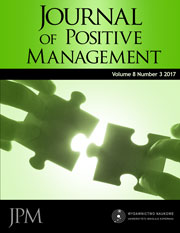Competences profiles of successors in contemporary family firms
DOI:
https://doi.org/10.12775/JPM.2017.126Keywords
competences, emotional intelligence, successor, family businessesAbstract
The article presented issues related to the competencies of successors in contemporary family firms. A particular emphasis was placed on the significance of leadership competencies in the management of the contemporary company. The author underlined the role of emotional intelligence which is an indelible part of the successors’ competencies as well as competencies related to the upbringing and socialisation. The paper also presented a profile of competencies of successors, which profi le related to those competencies that determine the effective management of the family businesses. It was elaborated on the basis of research results quoted in other researchers’ works, as well as findings of the author’s own research.
Purpose: to draw the readers’ attention to the significance of competencies of successors in contemporary family firms, with a particular emphasis on the leadership competencies, emotional intelligence and competencies related to the upbringing and socialisation.
Methodology: literature research, author’s own survey research related to successors competencies
Findings: Those family enterprises that anticipate succession process should focus on competence profiles of their successors, while taking into consideration the role played by the competencies related to emotional intelligence. The fi ndings were confirmed by the author’s own research, where 19 competencies were selected from 33 competences grouped in 11 emotional intelligence-related competence groups; the said competencies, according to the successors, are of the key importance in the process of succession in family companies.
Originality/value: Upon the analysis of the studies by the researchers cited herein, and of the results of the author’s own research related to successors competencies being a determinant for eff ective management of modern family firms, the author put an emphasis on three groups of competencies, as provided for in the profi les of competencies of successors in modern family companies.
References
Blikle, A. (2012), „Specyfika zarządzania w firmach rodzinnych”, in: Firma w rodzinie czy rodzina w firmie. Metodologia wsparcia firm rodzinnych, PARP, Warszawa.
Bracci, E., Vagnoni, E. (2011), “Understanding Small Family Business Succession in Knowledge Management Perspective, The IUP – Journal of Knowledge Management, Vol. IX No. 1.
Gardner, H. (1989), Frames of Mind. Theory of Multiple Intelligences, Basic Books, New York.
Goleman, D. (1996), Emotional Intelligence: Why It Can Matter More Than IQ, Bantam Books, New York.
Gudkova, S. (2014), „Gen przedsiębiorczości rodzinnej”, Relacje – magazyn firm rodzinnych, Vol. 6 No. 7, pp. 4-5.
Mikołajewska, E., Mikołajewski, D. (2013), „Informatyka afektywna w zastosowaniach cywilnych i wojskowych”, Zeszyty Naukowe WSOWL we Wrocławiu, No. 2.
Fundacja Firmy Rodzinne (2017), „Kluczowe składniki sukcesu. Kompetencje przyszłości w firmach rodzinnych”, available at: https://ec.europa.eu/epale/sites/epale/files/raport_kompetencje_firm_rodzinnych.pdf (accessed 15 April 2017).
Smoliński, M., Zakrzewska, L. (2017), „Przywódca musi być zaangażowany”, Harvard Business Review, Special Issue.
Sułkowski, Ł., Mariański, A. (2009), Firmy rodzinne, jak osiągnąć sukces w sztafecie pokoleń, Poltext, Warszawa.
Thor, W., Georgijew, I. (2014), „Biznes potrzebuje lidera o nowym typie kompetencji”, Harvard Business Review Polska, No. 9.
Tomski, P. (2011), „Programowanie przyszłości biznesu w oparciu o więzi rodzinne - wybrane problemy sukcesji”, Przedsiębiorczość i Zarządzanie, Vol. 12 No. 7.
Weroniczak, L. (2012), „Dialog międzypokoleniowy”, in: Firma w rodzinie czy rodzina w firmie. Metodologia wsparcia firm rodzinnych, PARP, Warszawa.
Downloads
Published
How to Cite
Issue
Section
License
Copyright
Articles submitted to the journal should not have been published before in their current or substantially similar form, or be under consideration for publication with another journal. Authors submitting articles for publication warrant that the work is not an infringement of any existing copyright and will indemnify the publisher against any breach of such warranty. For ease of dissemination and to ensure proper policing of use, papers and contributions become the legal copyright of the publisher unless otherwise agreed.
Plagiarism and ghostwriting
In response to the issue of plagiarism and ghostwriting the editors of the Journal of Positive Management has introduced the following rules to counteract these phenomena:
1. Contributors should be aware of their responsibility for a content of manuscripts.
2. Collective authors are obliged to reveal the contribution and an affiliation of each author (i.e. who is an author of specified part of a paper).
3. Any act of dishonesty will be denounced, the editors will inform appropriate institutions about the situation and give evidence of all cases of misconduct and unethical behaviour.
4. The editors may ask contributors for financial disclosure (i.e. contribution of specified institutions).
Stats
Number of views and downloads: 756
Number of citations: 0



